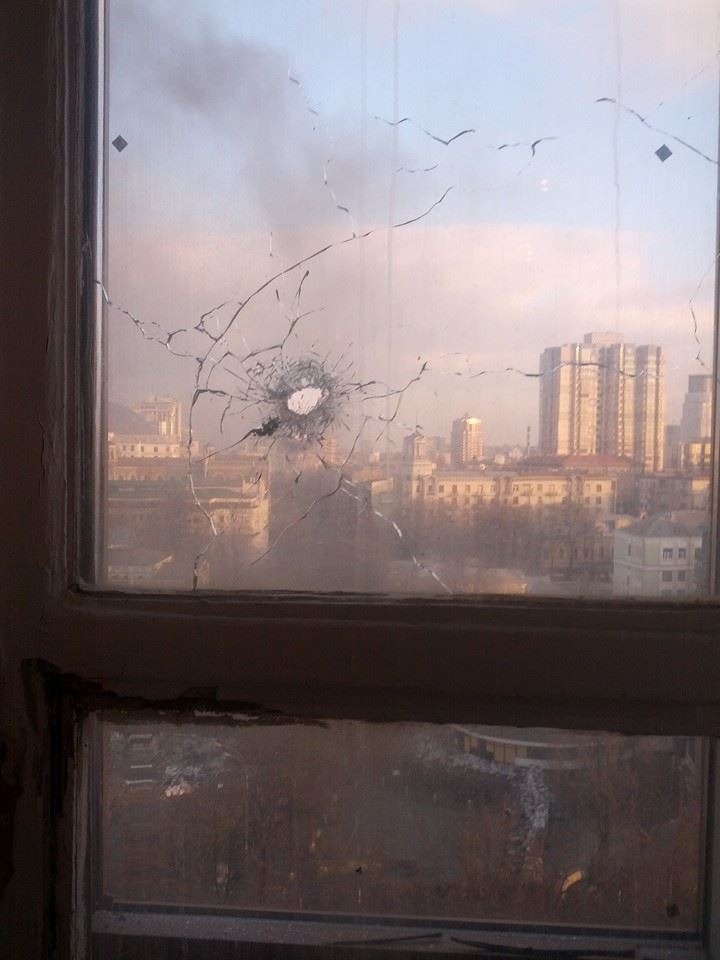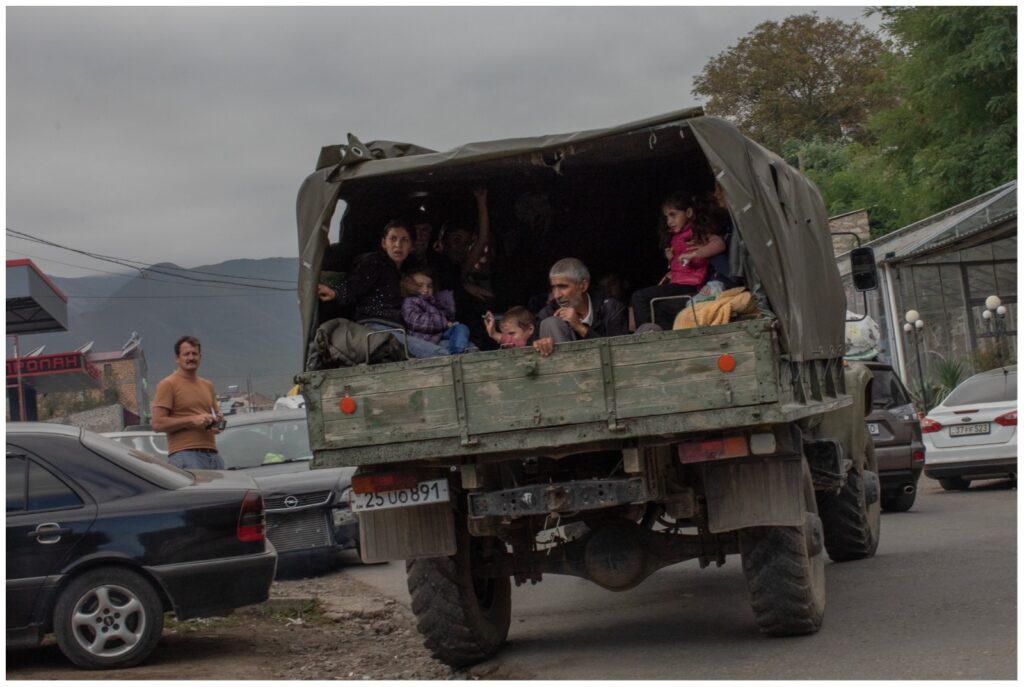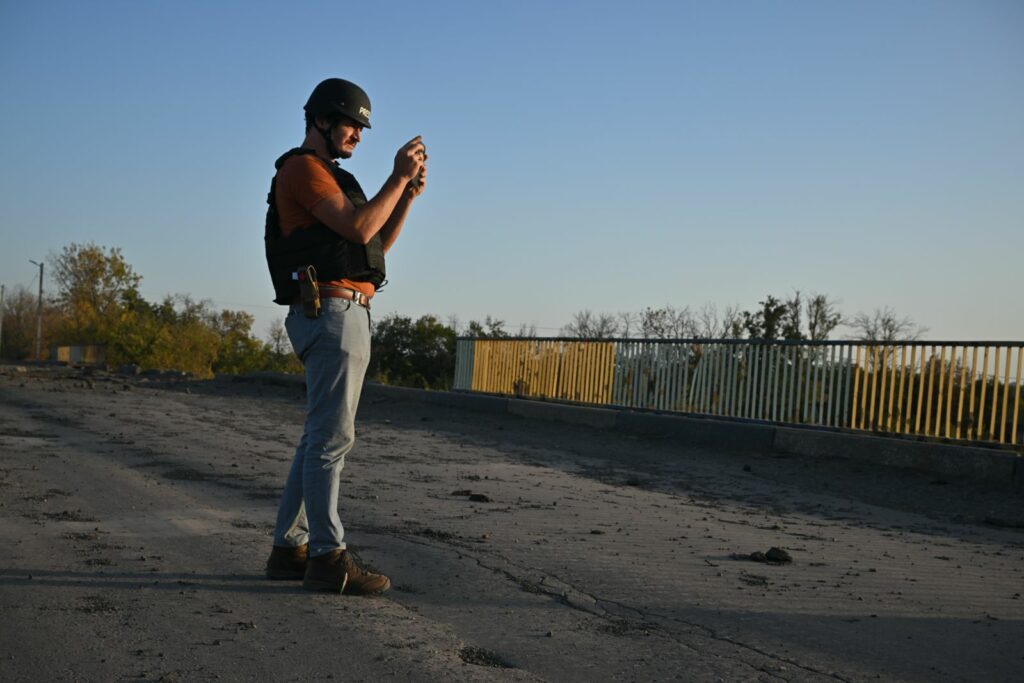by Sofi Tovmasyan
“I was standing by the window on the 12th floor of a hotel in Kyiv, the capital of Ukraine. It was February 20, 2014. Looking out the window, I saw police shooting and killing people walking up the street – until the moment when one of the bullets hit the very window I was standing in front of. That was the moment I realized: this is no game, and I am truly in danger. Had the bullet veered 1-2 meters, I could have been dead.”
Remembering the Euromaidan protests of 2014, German journalist Moritz Gathmann considers this episode a turning point in his professional career. He says he never wanted to be a war reporter; the war simply came to the region he was interested in.
Currently, Moritz Gathmann lives and works in Germany and mainly reports from Ukraine. In the past, he also worked in Russia. He has contributed to various media outlets, including Der Spiegel, Cicero, etc., and is currently working for Stern.

– Our region is far from peace, and when conflict erupts, anyone can record events on their smartphone and share them on social media. Thus, one can learn what is happening from different sources. In an age when technology allows for so much, what is the role of a professional journalist? What is the difference between you telling us stories from a conflict zone and other people?
– Two main factors distinguish us from people who simply repost or share content on social media. One is expertise, which means that you either know the language or the history of the conflict, because every conflict has a history. It doesn’t start today. The second thing is that nothing can substitute what you see with your own eyes.
I always say that, as a reporter, I’m contributing a small piece to a larger mosaic. Other colleagues are working on the ground, each seeing their own piece of reality, and then any reader can combine these different perspectives to get a more accurate picture of what’s happening. In conflict situations, both sides engage in an information war, distorting facts, pictures, and video footage to serve their narrative. And it’s extremely important to be there and see it with your own eyes and find out what happens.
There is so much happening at the same time, and sometimes you won’t be able to find out what’s happening at that exact moment, so you have to compare information and facts to have a realistic image of the events later.
– When we are in a safe area, the professional and ethical standards are different, and it is often easier to uphold them. How does the game change, when you work from a conflict zone?
– In conflict zones, you often face restrictions. Authorities, press officers, or the military may only want you to see a filtered picture of events. But to do your job, you need to uncover the truth. That sometimes means doing things that might not strictly follow the rules. For example, authorities might tell you, “You’re not allowed in this zone” or “You can only report what we show you.” But if you work like that, you won’t uncover what’s happening.
When working in Ukraine, for instance, it’s all about contacts. If you establish trust with an artillery unit or a battalion, they might let you stay with them. That’s where you learn what’s happening. If you rely solely on official channels, you’ll only see a superficial version of reality. Of course, this approach can lead to conflicts—press officers might reprimand you or revoke your credentials. But honestly, that’s not the worst thing that can happen. Also, as a Western journalist, you still have some kind of safety. The main thing is not to lose your nerves, otherwise it may end up badly.
– You mainly report from Ukraine. How do you think your approach would change if there were a war in your homeland?
– I think about it a lot, but I hope this will never happen. Although the war in Ukraine is now very much connected to us, the situation is different from 2014; we are very much part of the conflict, and politically we are on their side. In 2014, we maintained greater distance from the conflict.
In the event of a war in my country, questions that arise now in Ukraine’s situation, will arise in a much sharper way. For example, what do you do if you have information that somehow harms your country? In the case of Ukraine, there are challenging aspects like corruption, problems with mobilization, or incidents where Ukrainian forces may have shot Russian prisoners of war. If you uncover such cases or have footage or information, your responsibility as a journalist is to publish it and tell the truth about what’s happening. Of course, reporting on such issues can play into Russian propaganda efforts – they’ll use it in their information war. But as a journalist, you can’t avoid the truth. In the first year of the war, I was so shocked by what was happening that I became too much of an activist in my work. At times, I avoided reporting certain things because I worried about the impact. I would think, “What effect will my work have? If I write about this, it could negatively affect Ukraine. So maybe I’ll write about something else instead.” Over time, though, I found a better balance. After that first year, I became more focused on doing my job properly, even if it meant receiving criticism. And I’ve received plenty of it because of this approach. When a war erupts, in the beginning everybody is grouping around the castle, but after some time journalists find balance and start to do their job.
– Do you remember your first experience in a conflict zone and how you found yourself there?
Yes, but the unfortunate thing is that I’m not very happy that I became a war reporter, because I didn’t want to, it was not my will to be a war reporter. I am a historian and I basically chose the region when I was studying. My first journalistic piece was about Nagorno-Karabakh in 2003, although there were no active military operations then. Of course, at that time, I had a more naive perspective on various events. (Moritz Gathmann also reported on Nagorno-Karabakh in 2023, during the forced displacement of more than 120.000 Armenians.)

From 2000 to 2006, I was studying Russian and Polish, I traveled a lot to Ukraine, Belarus, Armenia and Russia. Back then, who would have thought that there would be such a war between Ukraine and Russia?
During the Euromaidan protests, at first everything seemed calm, but then it turned into bloody clashes. The bullet that hit my hotel room window in 2014 was truly a turning point. After that shot, I spent almost an hour lying on the floor of my room, then I called my friend who was in the same hotel. I didn’t expect that bullet, and at that moment I stopped being just a journalist. Later, of course, it became clear how important it is to be able to quickly orient yourself in such situations, to learn how to protect yourself, and acquire first aid skills.
Looking back, I think that if these events were happening today, with my current experience and perspective, I would rather be in Donbas, not Kyiv, to get a sense of what’s happening there, to explore places others may overlook, and uncover different perspectives. For instance, if a house is burning and 100 journalists are standing around the burning house, it might be more interesting to go somewhere else and find out what people are thinking. If you are 200 meters away from the burning house, maybe you will learn something different about the situation – like why the house is burning or who set the house on fire. So, this is the kind of lesson I’ve learned.
– Being a journalist in a conflict zone is truly a meaningful job, providing critical information to people, often at great personal risk. These reports also become part of a valuable archive. But what comes next? Where does a journalist’s influence end, and do we have a wider impact beyond this?
As a historian, I have a deep understanding of the importance of sources, which is why I go directly to the scene of events and report on the developments firsthand. Additionally, I write opinion pieces, and I know that many people read my articles, some of whom even reach out to me personally. My role also involves shaping and influencing public opinion. What I share with the German public about what’s happening in Ukraine can help them form their own views on the conflict – after all, I’m the one telling them what’s happening on the ground, the challenges within the country, whether there’s any chance for peace, and where this war is ultimately headed. I also have background conversations with politicians because I have the information they need, and I’m equally interested in understanding the strategic position of our government on this conflict.
– Considering the impact of your work, how do you decide when and where to go in order to get the most out of it?
– This time, I was in Pokrovsk, then I went to Slovyansk, and I spent the last six days in Kyiv. I prefer working with photojournalists who have a strong network – it really makes a difference in resolving many issues. This time, I worked with Stanislav Krupar, who’s from the Czech Republic and is based in Donbas. He’s been there for several months now and even knows the snipers personally. All it takes is one phone call, and we can go out and cover whatever we need. Stanislav and I ended up spending the night in the home of a Ukrainian priest. The household consisted of us, the priest, his wife, their three children, and two other Ukrainian men. In order to capture the local people’s true feelings and experiences, and to write about the events as clearly as possible, I now prefer staying in locals’ homes. You can never truly get what you need unless you communicate with residents. Staying in a hotel distances you from the reality of the situation. Then, when journalists gather together, everyone starts sharing the information they have, and you almost lose the essence of what you’ve seen and experienced yourself.

– Is there a particular story that has struck you as especially horrifying or impactful, one that stays with you?
– Stanislav and I were visiting a widow in Transcarpatia last autumn. She had buried her husband, and we went to her house and interviewed her the next day. Her mother was also there, there were the two kids in the house, and this was totally devastating. I’ve seen really bad stuff in this war, you know, like crushed bodies of soldiers or whoever. But this goes directly to your heart and soul. When we left we were totally devastated because we saw the tragedy of this woman, she had the medal of her husband, but all she wanted was to have her husband back home.
– Why do you think you remember this story?
– It destroyed me emotionally, it was so direct. I remember it because it hurt me the most. Maybe the difference is that when soldiers are on a frontline, they shoot others, others shoot them, they know they can die because they are actively taking part in the war, so somehow there is a certain logic to it, but there you have these people who are totally passive. They are 1000 kilometers away, but they are still suffering. It took me very long to get out of these destroying thoughts. I really got depressed last winter after this. Last time we also visited other families like this. Actually, it took me half a year to recover, I also got psychological help, Stern provides this for reporters. It helped me to go back to Ukraine again.
– Moritz Gathmann, who has never been to a war zone, and Moritz Gathmann, who has been there multiple times – are they still the same person?
– You know, I was brought up in a German village in the south of the country, in a very safe environment. I thought that war was something happening very far away. This changed, and I had to take a lot of lessons of what war can do with me, how it can destroy my life. Before this shot of a bullet through the window I was much more naive about life, so I lost the first part of naivety in 2014, and the second half in February 2022. I’m now, let’s say, a realist with a tendency toward pessimism. I think that’s a better way to look at the world that we have today. Things may happen that are out of our imagination. This conflict is also very connected to my family, my wife is Russian, she understands everything, but it’s still a challenge. The main thing is that I cherish life much more than I did before. I understand how happy I am to live here in Germany, where nobody’s shooting any rockets at my home, where my children can go to school and kindergarten, where I can go to a club all night and dance, enjoy my day with my family and friends and really cherish what I have now. Every time I go to Ukraine, I know that I can come back here, and my kids will take me to play with them, pulling me out of that reality. And this helps a lot. I met a lot of war reporters who mentally can’t get out of this anymore. Stanislav, for example, when he goes to Prague, to his hometown, gets depressed, so he has to go back to Donbas, because he doesn’t have family. So, I wish everyone could have this safe space, which gives a feeling of grounding.
This article was published within the frames of “Correspondents in Conflict” Project,
implemented by Yerevan Press Club and Deutsche Gesellschaft e. V. The Project is
funded by the German Federal Foreign Office within the “Eastern Partnership Program”.
The contents of this article are the sole responsibility of the implementing partners and can in
no way be taken to reflect the views of the Federal Foreign Office. #civilsocietycooperation
 Sofi Tovmasyan is a journalist and PR specialist who studied in Yerevan, Armenia. She is a freelance reporter focusing mainly on human stories based on the psychological, socio-economic, and emotional well-being of refugees, who have suffered the most due to conflicts and wars. She is also currently working on a series of video stories on war crimes by searching for and telling the stories of people who have experienced them personally. Her main focus is to raise difficult and painful topics, thereby contributing to increased public awareness and the emergence of positive changes.
Sofi Tovmasyan is a journalist and PR specialist who studied in Yerevan, Armenia. She is a freelance reporter focusing mainly on human stories based on the psychological, socio-economic, and emotional well-being of refugees, who have suffered the most due to conflicts and wars. She is also currently working on a series of video stories on war crimes by searching for and telling the stories of people who have experienced them personally. Her main focus is to raise difficult and painful topics, thereby contributing to increased public awareness and the emergence of positive changes.












